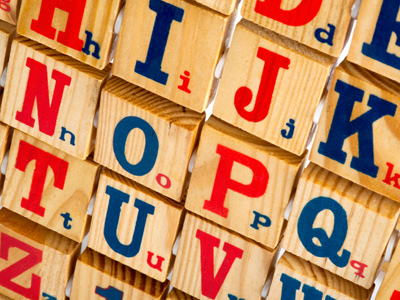
Two of the letters in the modern alphabet were unknown in the 15th century.
The Spoken Word
The Spoken Word challenges you on language.
People in England during the Middle Ages spoke what is known as (unsurprisingly) Middle English. It had developed from Old English (which closely resembled German) with the addition of French words brought in by the Norman invaders. By Richard III's time the language resembled Modern English much more than it did Old English and it is (mostly) understandable today.
1 .
Many words did not survive into Modern English. Which animal was known during the Middle Ages as an 'attercop'?
An adder
A lark
A carp
A spider
The Old English name 'attercop' was still in use at the time, alongside 'spither'. Over the years 'spither' became 'spider' and 'attercop' was lost. Its influence can still be seen though, in the modern word 'cobweb,' which is derived from, 'copweb'
2 .
The most famous writer in Middle English was Geoffrey Chaucer. How many Modern English words are first found in his works?
About one thousand
About two thousand
About three thousand
About four thousand
Although the words are first found written by Chaucer, they were probably already in common use and not invented by him. Some examples are; box, scissors, princess, funeral, universe and laxative
3 .
German, French and Latin were not the only influences on Middle English. The words anger, dirt, mud and skull come from which foreign tongue?
Dutch
Norse
Irish
Welsh
Many Viking words entered the language after their invasions prior to the 12th century. Irish, Welsh and Dutch words also entered English due to trade and migration, but in much smaller numbers than French, Latin and Norse
4 .
Several words used in Middle English have changed their meanings over time. What did the word 'nice' mean in the 15th century?
Fancy
Foreign
Foolish
Foul
Other words which have changed their meaning are 'brave' which meant 'braggard', 'sophisticated' which meant 'unnatural' and 'silly' which meant 'lucky'
5 .
Pronunciation began to change a great deal towards the end of the 15th century. What name is given to this change?
The Great Vowel Shift
The Long Word Stretch
The Weak Noun Drop
The Old Plural Change
In Middle English vowels were pronounced differently than today.
The letter 'A' was pronounced as in 'Father,'
The letter 'E' as in 'Fete,'
The letter 'I' as in 'Receipt,'
The letter 'O' as in 'To,'
And the letter 'U' as in 'Doubt.'
This accounts for much of the difference in spelling from Modern English. The word 'blood' was mostly spelt 'blud' and pronounced 'blowd'
The letter 'A' was pronounced as in 'Father,'
The letter 'E' as in 'Fete,'
The letter 'I' as in 'Receipt,'
The letter 'O' as in 'To,'
And the letter 'U' as in 'Doubt.'
This accounts for much of the difference in spelling from Modern English. The word 'blood' was mostly spelt 'blud' and pronounced 'blowd'
6 .
Spelling in Middle English varied immensely. Mahte, Mithe, Mouthe and Micht are all different spellings of which modern word?
Made
Mouth
Might
Maths
Spelling of words was at the discretion of the writer and varied so much that the same word was often found spelt differently on the same page!
7 .
Two of the letters in the modern alphabet were unknown in the 15th century. Which two were they?
Q and X
J and U
V and Z
W and Y
J was represented by a capital I and U was shown as a V. Other letters, which we do not use today were part of their alphabet, for example 'thorn', which resembled a letter P and 'eth' which resembled a letter D, were both used instead of 'th'
8 .
William Caxton had a great influence on the English language during the 15th century. He was the first Englishman to do what?
Write a novel in English
Translate the Bible into English
Write an English dictionary
Print books
Caxton printed the first book in English, Recuyell of the Historyes of Troye, which he translated himself. He also published a further 86 titles. Caxton was a friend of Richard III's sister, Margaret, Duchess of Burgundy
9 .
The new standard English was mostly influenced by the dialects of London and which other area?
The East Midlands
The South East
The West Midlands
The South West
At the time the East Midlands was the most populated and the wealthiest area of England. It also contained the scholastic cities of Oxford and Cambridge, which both influenced written English
10 .
In the 15th century a more standard form of the English language was developing. What was this form called?
Royal English
Chancery English
Legal English
Court English
Before the 15th century official documents were written in either Latin or French. They began to be written in English and the Chanceries, where they were made, lent their name to the standard English used to write them
**Unlimited Quizzes Await You! 🚀**
Hey there, quiz champ! 🌟 You've already tackled today's free questions.
Ready for more?
Ready for more?
🔓 Unlock UNLIMITED Quizzes and challenge yourself every day. But that's
not all...
not all...
🔥 As a Subscriber you can join our thrilling "Daily Streak" against other
quizzers. Try to win a coveted spot on our Hall of Fame Page.
quizzers. Try to win a coveted spot on our Hall of Fame Page.
Don't miss out! Join us now and keep the fun rolling. 🎉
**Unlimited Quizzes Await You! 🚀**
Hey there, quiz champ! 🌟 You've already tackled today's free questions. Ready for more?
🔓 Unlock UNLIMITED Quizzes and challenge yourself every day. But that's not all...
🔥 As a Subscriber you can join our thrilling "Daily Streak" against other quizzers. Try to win a coveted spot on our Hall of Fame Page.
Don't miss out! Join us now and keep the fun rolling. 🎉







